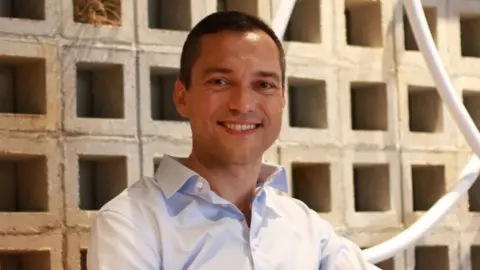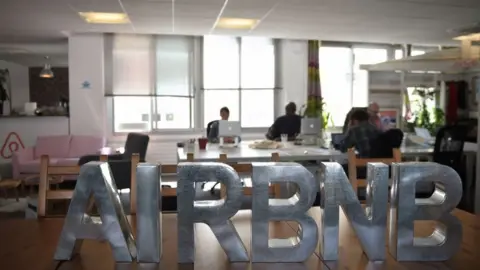Airbnb boss reveals plans to crack Asia market
 BBC
BBCNathan Blecharczyk was disrupting business models before the term was popular. The co-founder of Airbnb started coding at the age of 12 and launched an online marketing business while in high school with clients in over 20 countries.
Earning nearly $1m ($780,000) from his entrepreneurial endeavour, he paid his own way through Harvard University where he studied computer science.
After moving on to several jobs in engineering, Mr Blecharczyk took a calculated risk and joined two friends to start Airbnb in 2008 - the same time the financial crisis was in full swing.
When they couldn't find enough funding to get the business off the ground, they got creative - selling cereal in custom-designed boxes at the Democratic Convention during the 2008 presidential election.
 Getty Images
Getty ImagesThey sold enough "Obama O's" and "Cap'n McCain's" to raise $30,000 and eventually gain seed funding to get the company off the ground.
Today, the online home-sharing service is one of Silicon Valley's most valuable companies. Its estimated worth is around $30bn. So where does it go next?
New opportunities
Mr Blecharczyk, 34, who is also the firm's chief strategy officer, says it's firmly focused on expanding in Asia-Pacific.
The region has roughly 60% of the world's millennials like himself, young adults between the ages of 19 and 35 who are the fastest growing generation of consumers. However, only about 15% of Airbnb's four million global listings are based in Asia.
 Getty Images
Getty Images"It's a huge population and so much of that population is becoming middle class," says Mr Blecharczyk. "The first thing people want to do when they have discretionary income is travel. So, I think we'd be at a huge loss if we weren't popular in Asia, but huge everywhere else."
Perhaps its biggest challenge is finding success in mainland China. The number of outbound travellers from the country rose 6% to 135 million in 2016, according to the United Nations' World Tourism Organisation.
Stiff competition
But entry into the mainland market isn't a guarantee for success. For example, global ride-hailing app Uber stalled in China after launching there in 2014. It wound up buying a minority stake in its home grown rival Didi Chuxing last year.
 Getty Images
Getty ImagesAirbnb has roughly 100,000 listings in China, where it faces stiff competition from other online short-term rental platforms, especially Tujia.com which has more than 400,000 listings. Why does Mr Blecharczyk think it will succeed?
"All the local companies have destinations within China. But they haven't branched out and they'll find it difficult to do so. We have four million homes in 191 countries, so we're really focusing on our brand differentiation."
It is also learning from the mistakes of other global brands like New Balance and Michael Jordan who have faced legal battles with trademark infringement.
This past March, Airbnb unveiled a new name in China - Aibiying (爱彼迎) - meaning welcome each other with love - which is easier to pronounce for Mandarin speakers. The firm is currently having the Pinyin and Mandarin versions of the name trademarked in the mainland.
 Getty Images
Getty ImagesRegulatory hurdles
While Airbnb has been successful in disrupting the traditional business model of the short-term housing and hotel industry, it's had its fair share of resistance from regulators across the globe.
This year, for example, New York and Barcelona cracked down on home-sharing platforms amid criticism they drive up rents and reduce local housing stock. Airbnb hosts who advertise illegal room-rentals face heavy fines.
While Mr Blecharczyk didn't discuss this, a spokeswoman for the firm says: "The governments we work with understand the benefits of Airbnb to their cities... But it can take time for legislation to catch up to new innovations."
In Asia-Pacific, home-sharing companies won a legal battle in June 2017 when the Japanese government gave them their approval.
 Getty Images
Getty ImagesBut other parts of the region will be harder to penetrate, says Prof Brian King, associate dean of the School of Hotel and Tourism Management at the Hong Kong Polytechnic University.
"Examples of more difficult operating environments include Hong Kong and Singapore which is host to Airbnb's Asia-Pacific operations," he says.
"Singapore has recently softened the minimum rental requirement from six to three months which offers some hope for faster expansion in future. Progress varies by country but overall Airbnb is competing effectively with local equivalents."

More The Boss features, which every week profile a different business leader from around the world:

 Reuters
ReutersThe firm recently made headlines for an entirely different reason. Hours after riots erupted in the US state of Virginia, it became one of the first companies to take a public stand and remove white nationalist users from its platform who attended the Virginia rally.
"We believe in the power of travel to bring people together to foster inclusion," Mr Blecharczyk says. "And when we see things happening in the world that are contrary to that, we have to ask ourselves do we want to live by our values or are they things we just write down because they sound nice."
Founder-cum-host
For Mr Blecharczyk, experiential travel is his passion.
When the father of two is not at home in northern California, he's hopping around the world testing out different Airbnb accommodation and trying out its new feature Trips.
This offers experiences where travellers can get a glimpse into the local culture through activities like cooking classes, hiking and cultural tours.
 Getty Images
Getty ImagesIf you find yourself renting an Airbnb in San Francisco, you may find Mr Blecharczyk delivering you fresh towels to the residence. He's also a host. Although he said most people don't know who he is because the account is set up discreetly.
His own choice in accommodations varies. Mr Blecharczyk has stayed in a castle in Italy with a vineyard, a modern bamboo treehouse in Bali on his anniversary, and several luxury homes in Hawaii.
But while he may have made Forbes' list of youngest self-made billionaires, he's not afraid to rough it. The cheapest place he rented a few years ago was in Latvia for $18 a night.
"I stayed with this guy for three days who gave his bedroom to me and he slept on the couch in the living room, a very small modest place. But it was super cool.
"Sometimes when you stay with a host, those turn out to be the most interesting experiences. He literally spent the next 48 hours with me taking me around town.
"It turns out we both like to ride bikes, so we spent the whole day riding bikes. For roughly 50 bucks, it turned out to be a very memorable experience."
